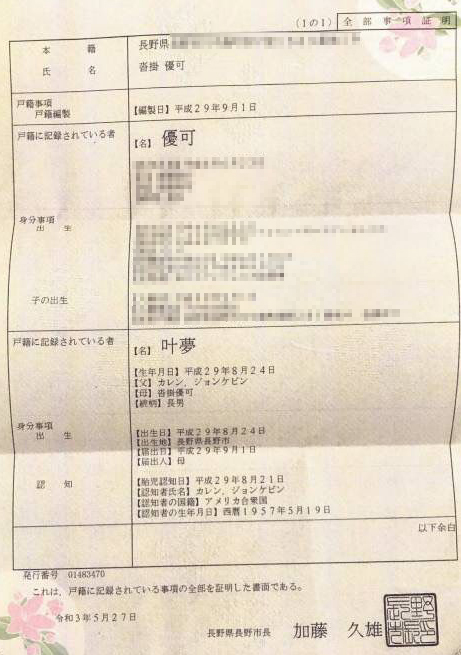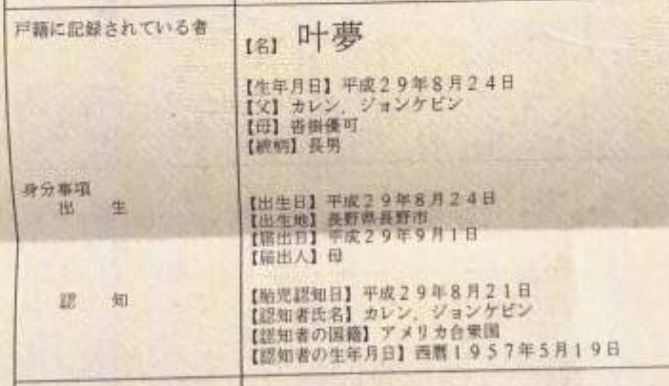

A koseki tohon is a comprehensive copy of a family register in Japan. A family register is an official document that records the vital events and relationships of a Japanese family, such as births, deaths, marriages, divorces, adoptions, and citizenship changes. A koseki tohon contains the information of all the family members who share the same family name and registered domicile. It is used to prove one’s identity, nationality, and family status for various purposes, such as applying for a passport, getting married, inheriting property, or enrolling in school. A koseki tohon can be obtained from the local city office where the family register is kept, by submitting an application form and paying a fee. Only the person who is listed on the koseki tohon or their legal representative can request a copy.
The arrival of the family register felt like a weight lifting from my chest, replaced by a lightness that spread through my entire being. It was more than just a piece of paper; it was a tangible symbol of a connection that transcended years of separation and the miles that stretched between us. For 600 long days, the ache of parental alienation and the pain of child abduction by his Japanese mother had gnawed at my heart. This official recognition wasn’t just legalese on a document; it was a cherished validation of the paternal bond I’d always felt for my son, a bond that distance and legal hurdles could never sever.
Knowing my name is etched next to his in the family register is a precious step forward, a beacon of hope in the darkness. It fuels the unwavering belief that someday soon, the physical distance will be bridged. I yearn for the day when I can finally hold him close, feel the warmth of his embrace, and whisper in his ear the words I’ve longed to say: “I love ❤ you TJ.” That joyous reunion will be the true beginning of building a meaningful relationship, a relationship where we can share stories, laughter, and all the joys life has to offer. This official recognition may be just a piece of paper, but for me, it represents the opening chapter of a future filled with love, connection, and the unbreakable bond between a father and his son.



日本には戸籍という家族の記録がまとめられた公的な台帳があります。出生、死亡、婚姻、離婚、養子縁組、国籍変更といった家族の出来事や関係が記載されています。戸籍謄本は、同じ名字と本籍地を共有する家族全員の情報が載っている戸籍の全部抄本です。パスポートの申請、結婚、相続、入学など様々な手続きで、自分の身分や国籍、家族構成を証明するために使われます。
戸籍謄本を見た瞬間、胸の重みがすっと消え、全身に軽やかさが広がりました。それは単なる紙切れではなく、長年の離別や距離を超えたつながりの確かな象徴でした。600日という長い間、親子の引き離しと、息子を日本人の母親に連れ去られた苦しみは、私の心を蝕んでいました。しかし、この公的な承認は、単なる書類上の手続きではなく、どんな距離や法的障害にも断ち切れない、父親として息子に対してずっと抱いていた絆を大切にしてもらえたことの確認でした。
自分の名前が息子の隣に戸籍に刻まれていることを知ることは、暗闇の中での希望の光であり、かけがえのない一歩前進です。いつか必ず、物理的な距離が縮まるという揺るぎない信念を奮い立たせてくれます。息子をぎゅっと抱きしめ、温もりを感じながら、ずっと言いたかった「愛してるよ、TJ」と耳元で囁く日を待ちわびています。この幸せな再会こそが、本当の意味での絆を築くための幕開けになるはずです。共に物語を語り合い、笑い合い、人生の喜びを分かち合える関係を築いていきたいです。この公的な承認は、ただの紙切れかもしれませんが、私にとっては、愛と絆、そして父親と息子という決して切れない繋がりで満たされた未来の第一章なのです。